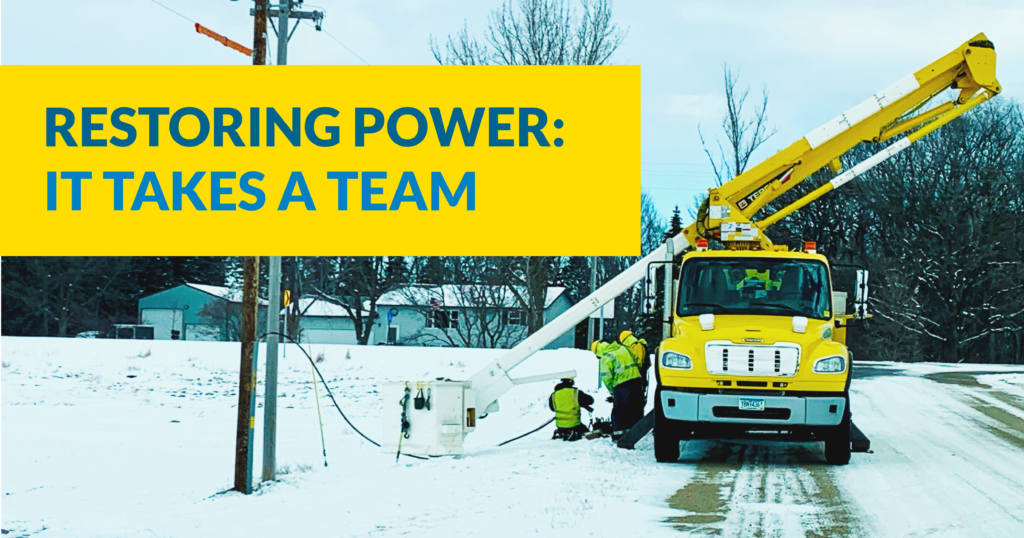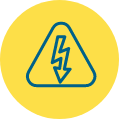
McLeod Co-op Power works diligently to maintain consistent power quality and reliability. However, with thousands of miles of power line exposed to the elements, trees, and small animals, power outages do occur. And when they do, it is incredibly important that members report an outage because it is simply the fastest way to locate an outage cause and get the problem resolved.
When members call to report an outage during business hours, the member location of the outage is entered into the computer system with special software that documents each outage and tracks the source of the problem. Likewise, members can report outages using their SmartHub account, which is tracked using the same outage system. The more reports the Co-op receives from members, the faster we can pin down whether the outage affects single properties or an extensive area. Those reports help determine the possible cause of the outage and that information can be relayed to the crews.
Debbie Ebert, Operations Specialist
I remember my first major outage. A major snowstorm came through our service territory and we worked well into the night. Everyone jumps into action when outages start rolling in. At the time of this particular outage, we still printed individual reports on a piece of paper and then sorted them by substation, feeder, and phase before assigning crews. Fast forward to 2022 our system automatically sorts outages, we have an active map graphic showing and allowing us to easily track outages and crews.
Lineworkers head out to assess the situation of an outage as soon as they can to determine the issue and restore power as fast as possible. When responding to outages, McLeod Co-op’s first priority is the safety of our crews and the public. Crews are sent to remove damaged power lines from roadways first. After that, substation power is restored. Sometimes, service to hundreds or several thousand customers can be restored immediately by operating a switch or refusing a high side fuse in the substation.
Next, the major distribution feeders are repaired. These are the lines that come out of a substation that have three wires resting on a cross arm. If energy cannot be distributed over these lines, your home cannot receive power. Tap lines are repaired next. Tap lines carry power to groups of homes from the distribution feeders.
Ryan Schuette, Line Foreman
Back in February 2018, we had a circuit out at our Hector substation. By the time we got out there, we found out snowplows had been pulled off the roads. We had to find a road grader with a v plow to make a path for us to patrol the circuit. With the 40 mph winds, there were spots on the road that had snowdrifts 10 feet deep. It was a memorable night. We ended up spending the night sleeping in the bucket truck at the gas station because the highway was closed and impassible.
Finally, individual service lines are repaired. After power is restored, line workers report the time and cause of the outage, and all are recorded. Reoccurring outages in specific areas may be a sign of a more significant issue.
When members report power outages after-hours their call is routed to CRC, and the same process occurs. It is important that when members report an outage they know the phone number associated with the account, the account number, or the address of the service that is out of power. This allows McLeod Co-op employees to speed up the process of locating an outage.
Sometimes we will plan outages in advance to complete line maintenance, repair faults, and make upgrades, among other reasons. If the outage is planned far enough in advance, we notify those who will be impacted.
Brad Hundt, Lineman
Back in the spring of 2020, Nate Kelzer and I had responded to an outage that involved a single-phase line where a car went off the road and struck two electrical poles. What made this incident unique was that we needed to use a kayak to access a pole for back feeding the line while we worked to restore power. Luckily, we found someone near Lake Allie that had a kayak that we could borrow.
There is no way to know how long an outage will take to restore, so please remember that McLeod Co-op will do everything it can to get your power restored as fast as possible in the event of an outage. Some outages are very short, but when severe weather leaves widespread damage, outages can last longer. In the event of a prolonged outage, oftentimes we’ll call on neighboring co-ops for support. This is called mutual aid. Co-ops that have additional crews available send help to restore power for our members faster.
Craig Marti, Line Foreman
In October of 2013, four of us went to South Dakota to help during a winter storm. We were there for 13 days rebuilding lines with the help of other coops from different states and the national guard. It was a humbling experience as people that were out of power for weeks were thanking us wherever we went.
It takes a team to restore power to members, and the members are also part of that team!
REPORT YOUR OUTAGE
Call us at 800.927.5685. If you have created a SmartHub account, you can report an outage online or via your mobile device by following the App’s “Report an Outage” link.
Terry Underdahl, Line Foreman
About ten years ago a large windstorm came through on the weekend of July 4th. There was an incredible amount of damage, there were even grain bins blown into the middle of fields. We worked day and night for four or five days to repair broken and leaning poles, and restore power to the many members that lost power.
We always appreciate your patience while crews work diligently and safely during power outages. Once we know about your outage, crews will be dispatched immediately, so your power can be restored as quickly as possible.
